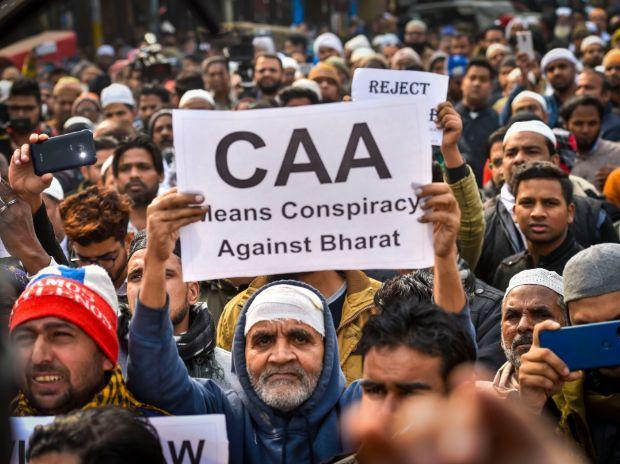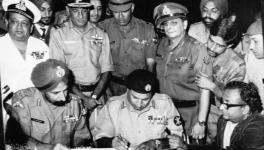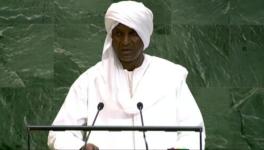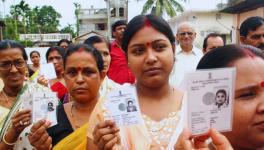Why India’s ‘Internal Matter’ Argument Has to Fail

Image Courtesy: PTI
In the wake of India passing the Citizenship Amendment Act, the United Nations High Commissioner for Human Rights, Michele Bachelet, has filed a petition seeking to intervene in the Supreme Court. She wants to join a legal challenge to the constitutionality of the CAA, which passed into law in December. Foreign Minister S Jaishankar has strongly rebutted her criticism of the newly amended law. He has argued that the UNHCR is wrong and blind to India’s problem with cross-border terrorism.
The issue at hand is the possibility of thousands of people, mainly Muslims, being declared stateless as a result of the combined operation of the CAA, and the National Population Register or NPR and the all-India NRC. The massive exercise of going through the responses and documents supplied by India’s 120 crore-plus population and screening each of them, especially after the experience in Assam, is not being seen a justifiable goal.
The CAA has been extensively debated, but despite hefty critiques, and despite the biggest mass opposition ever to any legislation in Independent India, the government appears determined to not relax its divisive provisions. The effort is reminiscent of the acts of dreaded regimes that have pursued sectarian goals and remained heartless towards their citizens; some of which have extinguished large masses of their population on specious grounds of race, identity and so on.
The government’s assertion is that the CAA is an internal matter of India, and that India’s sovereignty is all that matters! As far as sovereignty is concerned, we should be clear that in the current times any sovereign power has to consider the need to uphold citizenship as per the principle of non-discrimination, which is stipulated in Art 26 of the International Covenant on Civil and Political Rights.
Can such policies as religion-based citizenship, which affect large populations and can alter their citizenship status, be regarded as purely “internal”? The world is now said to be a global village. With this in mind, some worldwide norms have been formulated over the last few decades; and the norms related to human rights and migrations have been codified. India is also a signatory to many such covenants, including the ICCPR, which deals with refugees from other countries. One is not even talking about the speech delivered in Chicago by Swami Vivekananda, in which he had said that India’s greatness has been in giving shelter to people from different parts of the world. One is also not talking of the Taittiriya Upanishad’s ‘Atithi Devo Bhava’ or the ‘Vasudhaiva Kutumbakam’, referred to in the Maha Upanishad.
What is being talked about are basic values and the opinions of organisations which want to preserve the human rights of all people worldwide. It is in this context that India’s calling the United Nations body a “foreign party” has to be viewed. The truth is that various United Nations organs have been monitoring different states and intervening at the legal level as an amicus curiae or ‘friend of the court’ in many countries. To mention only a few, the United Nations and the UNHCR intervened in the United States Supreme Court, the European Court of Human Rights, the International Criminal Court and the Inter-American Court of Human Rights. These are meant to help the courts in areas where United Nations’ bodies have expertise.
This expertise itself has been jointly formulated by various nations. Therefore, these interventions serve to remind nations of the existing global norms that have been jointly evolved and what their individual obligations towards them are. In a recent write-up, lawyer Arvind Narrain drew attention to the fact that the UNHCR has “intervened in the European Court of Human Rights in cases involving Spain and Italy to underscore the principle of non-refoulement, which bars compulsory expulsion of illegal migrants… Similarly, the United Nations has intervened in the International Criminal Court in a case against the Central African Republic to explicate on the international jurisprudence on rape as a war crime.”
From time to time organisations such as Amnesty International and Human Rights Watch have also monitored the human rights situation in different countries. This often puts the countries in uncomfortable situations and their establishments, therefore, do not welcome these organisations. How should this contradiction between “internal matter”, “sovereignty” and the norms for human rights be resolved is the tough question. Yet it needs to be remembered that it is being asked at a time when freedom indices and the democratic ethos are sliding down almost all over the world, including in India.
In India we can look at the intervention of a United Nations body from the perspective of equality and non-discrimination. Democratic spirit should encourage us to rethink matters which have been decided by the state. In the face of the mass movement of Shaheen Bagh, the state does need to look inwards, but at the very least it must also spare a thought for international morality and the spirit of global family.
The popular perception is that when Christians were being persecuted in Kandahmal the global Christian community’s voice was not strong enough. Currently, in the face of Delhi carnage, many a Muslim majority countries have spoken out. Prime Minister Narendra Modi claims that his good relations with Islamic countries causes heartburn to Opposition parties (especially the Congress), but now he needs to reconsider this kind of gloating. Iran, Malaysia, Indonesia and other Islamic and Muslim-majority countries have spoken out against what his regime is unleashing in India.
Bangladesh, India’s neighbour, has also seen various protests against the plight of Muslims in India. More than the “internal matter” argument, what needs to be thought out is the moral aspect of the whole issue of CAA-NRC and NPR. We pride ourselves on treading the path of morality. What does this mean today, when a large section of the local media is servile to the state, while a section of the global media strongly brings out the other side of what is happening to minorities in India.
The hope is that the Indian government will wake up to its international obligations and India’s declining image in the world due to the CAA and now also the horrific violence in Delhi.
The author is a social activist and commentator. The views are personal.
Get the latest reports & analysis with people's perspective on Protests, movements & deep analytical videos, discussions of the current affairs in your Telegram app. Subscribe to NewsClick's Telegram channel & get Real-Time updates on stories, as they get published on our website.
























